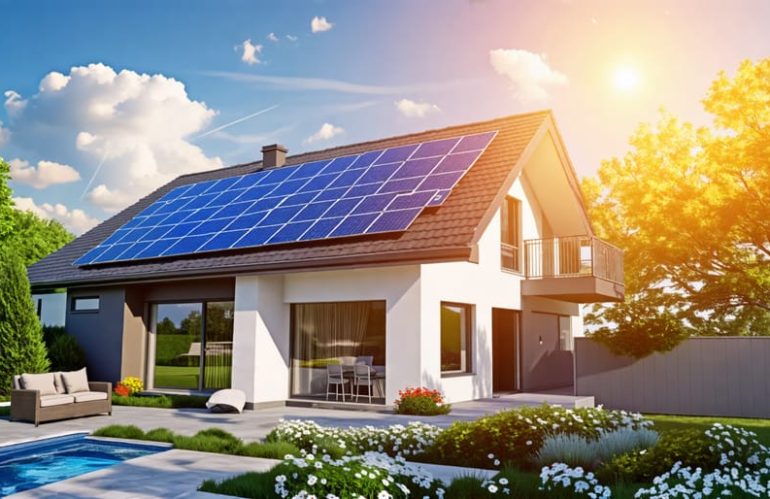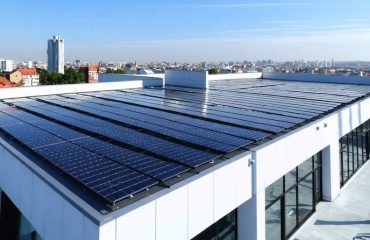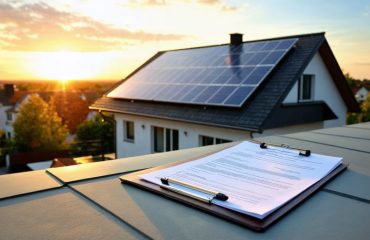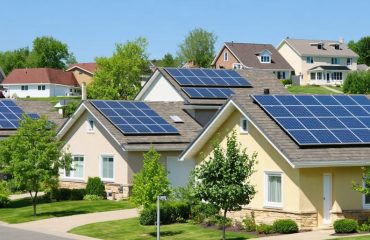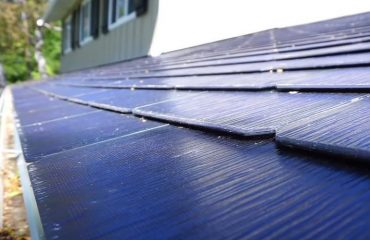Harness the growing popularity of solar panels by understanding how they impact your homeowners insurance. Standard policies typically cover rooftop solar panels, but ground-mounted systems may require additional coverage. Contact your insurer to confirm your solar array is adequately protected and to update your policy if needed. By taking proactive steps to insure your solar investment, you can enjoy clean energy with peace of mind.
Understanding Solar Panel Coverage Under Standard Home Insurance
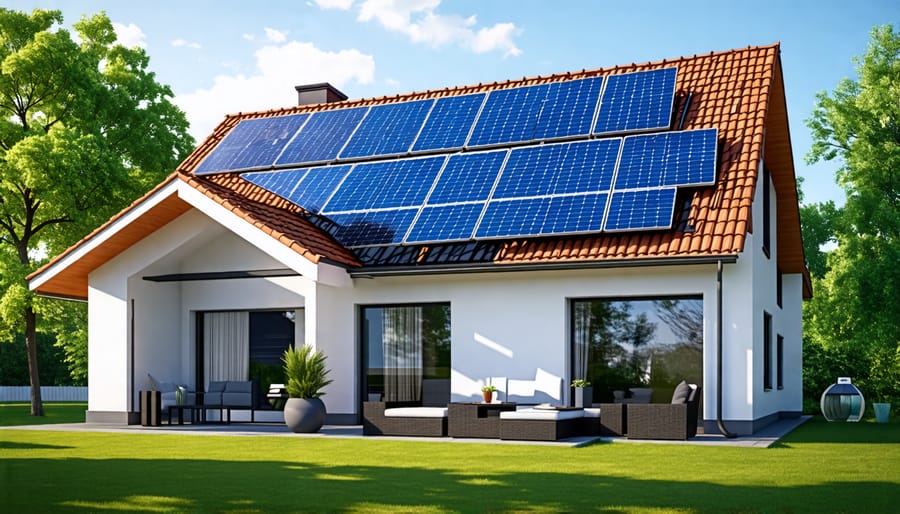
Rooftop Solar Panels
Most homeowners insurance policies cover rooftop solar panels as part of the home’s structure, offering protection against risks like fire, hail, wind, and theft. However, it’s crucial to notify your insurance provider about the installation to ensure adequate coverage limits. Some insurers might require additional coverage or charge a slightly higher premium due to the increased value of your home. When filing a claim for damage to your solar panels, the process is similar to other home insurance claims. To maximize coverage, consider taking proactive measures such as regularly maintaining your panels and documenting their condition through photos. Overall, while rooftop solar panels might impact your insurance slightly, the long-term energy savings and environmental benefits often outweigh the minimal insurance adjustments required.
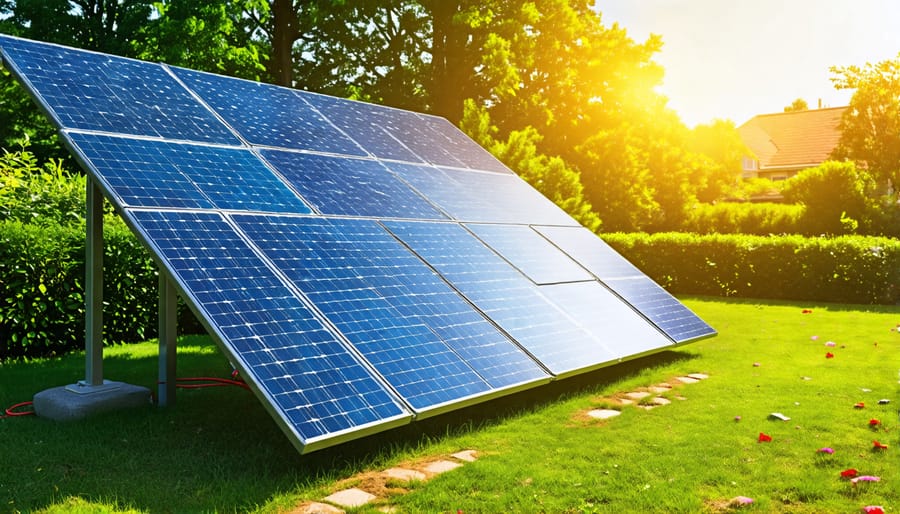
Ground-Mounted Solar Panels
Ground-mounted solar panels may require different insurance coverage than roof-mounted systems. While your homeowners policy typically covers roof-mounted panels as part of the dwelling, free-standing arrays are considered separate structures. This means they may have lower coverage limits or require an add-on to your policy for full protection.
To ensure adequate coverage for ground-mounted panels, discuss your installation with your insurance agent. They can help you determine if you need to increase your coverage limits for other structures or add a rider specifically for the solar array. Keep in mind that factors like the size and value of your ground-mounted system will impact the amount of coverage needed. By proactively addressing insurance for your free-standing solar panels, you can have peace of mind knowing your investment is properly protected.
Scenarios Where Additional Coverage May Be Needed
High-Value Solar Panel Systems
If your solar panel system is of particularly high value, it’s wise to consider increasing your coverage limits. Standard homeowners policies may not provide enough coverage for more expensive or extensive solar installations. Discuss the value of your solar investment with your insurance agent to determine if you need higher limits. They can guide you on the appropriate coverage amount based on factors like the size, cost, and quality of your solar array. By ensuring your coverage limits align with the value of your system, you can have peace of mind knowing you’re adequately protected. It’s better to be proactive and adjust your coverage before any potential issues arise. Your insurance agent is there to help you navigate these decisions and find the right balance between sufficient protection and affordable premiums.
Leased or Financed Solar Panels
For solar panels that are leased or financed through a third party, insurance considerations may be different. In these arrangements, the solar company typically maintains ownership of the panels and is responsible for their maintenance and repair. However, it’s still important for homeowners to review their contracts and insurance policies carefully. Some leasing or financing agreements may require the homeowner to carry additional liability coverage. It’s also wise to inform your insurance provider about the leased or financed solar panels to ensure there are no gaps in coverage. If damage occurs to your home related to the solar panels, it’s crucial to understand who is liable for repairs and potential deductibles. Communicating with both your insurance company and the solar panel provider can help clarify responsibilities and ensure you have adequate protection for your unique setup.
Off-Grid Solar Energy Systems
For homeowners using off-grid solar energy systems, insurance needs can be more complex. These standalone setups aren’t connected to the utility grid, relying solely on solar panels and battery storage. Insurers may view off-grid systems as higher risk due to potential battery hazards and the lack of a grid backup. To ensure adequate coverage, inform your insurer about your specific setup, including battery specs and any safety measures in place. Consider additional coverage for the batteries, as they can be costly to replace if damaged. Work with an agent specializing in solar to craft a policy that protects your investment while meeting your unique off-grid needs. With proper insurance, you can enjoy the independence and sustainability of an off-grid solar system with peace of mind.
Ensuring Adequate Coverage for Your Solar Investment

Review Your Policy With an Insurance Agent
It’s always a good idea to review your homeowners insurance policy with a professional agent, especially when making significant changes to your home, such as installing solar panels. An experienced agent can help you understand the specifics of your coverage and identify any potential gaps or areas where additional protection may be necessary. They can also guide you through the process of obtaining supplemental coverage if needed, ensuring that your solar investment is adequately protected. Don’t hesitate to ask questions and seek clarification to make informed decisions about safeguarding your home and solar energy system. By working closely with an insurance agent, you can have peace of mind knowing that your policy is tailored to your unique needs and that you’re prepared for any potential risks associated with your solar panel installation.
Get Quotes for Additional Coverage If Needed
If your standard homeowners insurance doesn’t provide sufficient coverage for your solar panel system, consider shopping around for additional coverage. Contact your current insurer to discuss options for increasing your coverage limits or adding specific endorsements for solar panels. It’s also wise to get quotes from other insurance companies that specialize in or have experience with insuring solar energy systems. Compare the coverage options, premiums, and deductibles to find the best fit for your needs and budget. Don’t hesitate to ask questions and clarify any uncertainties about what’s covered. By taking the time to explore your options and secure adequate coverage, you can have peace of mind knowing that your investment in clean energy is well-protected.
Understand Warranty vs Insurance Protection
When investing in solar panels, it’s crucial to understand the difference between product warranties and homeowners insurance. Product warranties, provided by the manufacturer, typically cover defects in materials and workmanship for a specified period, often 10-25 years. These warranties ensure that your solar panels will perform as expected, but they do not protect against damage from external factors like severe weather or accidents.
On the other hand, homeowners insurance provides financial protection for your home and personal property, including solar panels, in the event of covered perils such as fire, theft, or natural disasters. However, standard homeowners policies may have limitations or exclusions for solar panels, so it’s essential to review your coverage with your insurance agent.
To ensure comprehensive protection for your solar investment, consider adding a specific endorsement or rider to your homeowners policy that covers solar panels. This additional coverage can provide peace of mind, knowing that your solar system is protected against a wide range of potential risks. By understanding the distinct roles of warranties and insurance, you can make informed decisions to safeguard your solar panels and enjoy the long-term benefits of clean, renewable energy for your home.
In summary, installing solar panels on your home is an excellent investment that can provide significant financial and environmental benefits. However, it’s crucial to ensure you have the proper insurance coverage to protect your investment. Standard homeowners insurance policies often include coverage for solar panels, but it’s essential to review your policy and discuss any specific needs with your insurance provider. In some cases, additional coverage may be necessary to fully safeguard your solar energy system. By taking the time to understand your insurance options and secure adequate protection, you can enjoy the many advantages of residential solar panels with peace of mind, knowing that your investment is well-protected. Don’t let concerns about insurance hold you back from embracing the importance of proper insurance coverage for your solar panels and taking a significant step towards a more sustainable and cost-effective future for your home.

